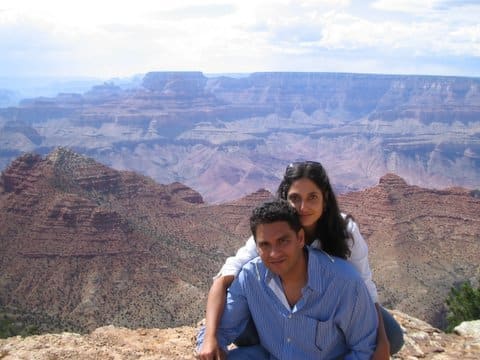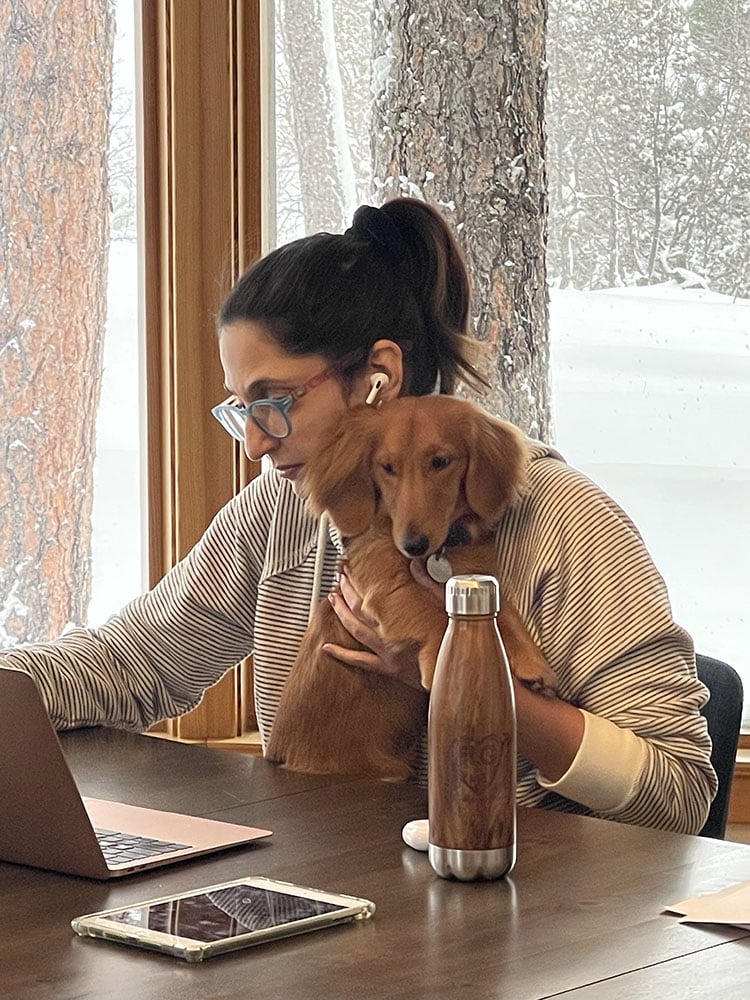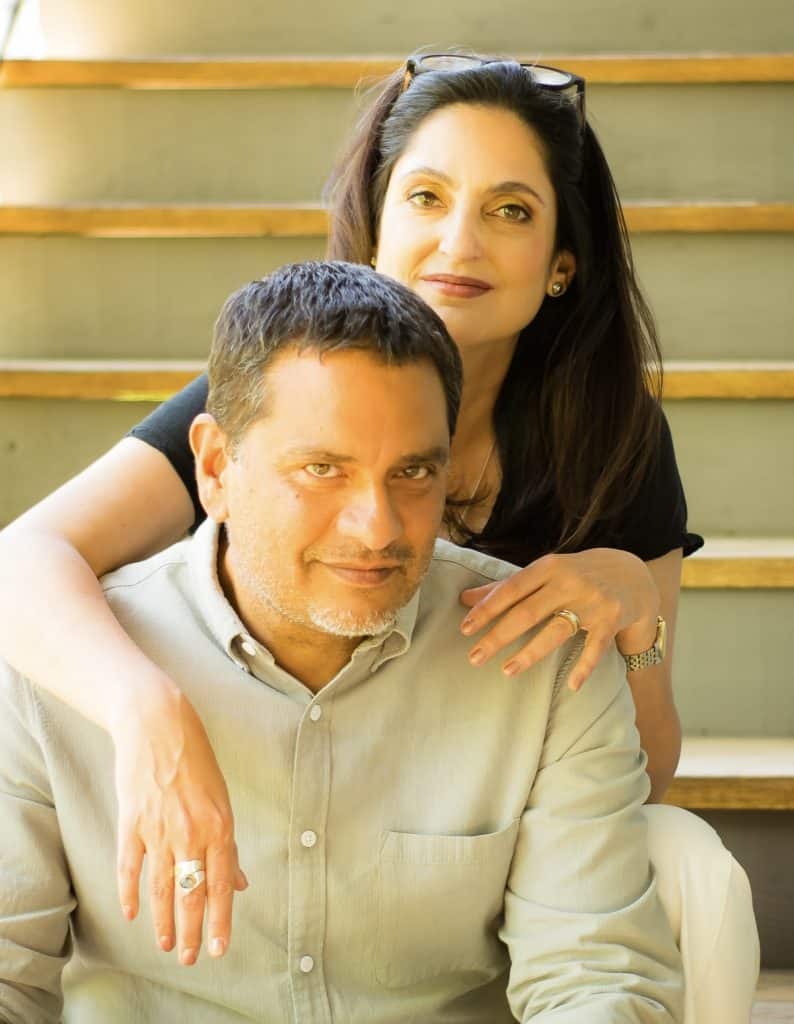For Rima Brusi, chiseling is part of the writing process, as are hunting and explorer. It’s an active process that has resulted in four books, including her latest, a memoir called Fantasmas. The anthropologist and NAU’s first lady talked to The NAU Review about why she loves Fantasmas, the pull of Flagstaff and all it offers and her favorite way to spend a day off.
What brought you to NAU?
[smiles] Sounds like a simple question, right? And yet, I start answering and find myself exploring the many layers that seemingly straightforward decisions have. The easiest and most rational sounding answer is, of course, that we came here to work at NAU. But to understand why NAU, I’d need to talk about our values, about the importance I think affordable and high-quality public higher education has not only for Arizona but everywhere and about how the culture and people of this campus are truly special, and not in a generic way: This community incarnates what the historical moment we are living necessitates. Then I’d have to add something about the landscape, too. People often say, “Flagstaff is beautiful,” and they are right, but this is no ordinary beauty. This place is something else: It overwhelms you one day, nurtures you the next. It is not just the majestic peaks, it is the tiny chipmunks. It is the sky’s bluest blue. When I first arrived, I would sometimes stare at a ponderosa pine for hours. That doesn’t sound very rational, but I think it was time well spent.

Tell me about your research.
I have three main lines of research. Since 2007, I have been obsessed with the topic of access to higher education, particularly as it relates to inequality and geography. I am especially interested in the role that institutions have or could have in increasing access. I have done applied research and advocacy on this topic in various places, including Puerto Rico, California and Florida. My methods of choice are ethnography and action research, but more often than not I work in teams and use mixed methods, quantitative and qualitative. Since 2017, I have been researching, writing and engaging in advocacy to protect Puerto Rico’s public schools and universities in the context of colonialism and disaster capitalism. Beyond the topic of education, I also write literary non-fiction (chronicles, essays, memoir and autoethnography) exploring everyday life and informed by anthropological and sociological methods and sensibilities.
Of the books you’ve written, do you have any favorites? Why?
I’ve written four books. All of them are literary non-fiction and include some autoethnographic or personal component, but I think my favorite is the memoir, Fantasmas. It is the most painful and personal of the four. It explores motherhood, memory and mind. I think there’s a moment in the life of every writer when we start obsessing about the potential for beauty and music that sentences have, often becoming compulsive editors of our own work to the point of putting at risk the integrity of the very piece we are trying to perfect. Fantasmas was my moment. People would ask, “what did you do all day,” and I would answer (with what I’m sure were “crazy eyes”), “chiseling, I was chiseling. Hunting down adverbs.” Things like that. I cut it by half before my publisher intervened.

A biologist. I still do, in a way. I like primates (macaques!!!). But I would be very happy, I think, studying wolves or otters. Brains, evolutionary theory, ecosystems. Mangroves!! I love mangroves. I became an anthropologist a bit by chance, because I happened to be hired as an RA in an ethnographic project, loved doing fieldwork and had a fantastic mentor. So, maybe when I “grow up” and retire, I’ll take some classes at NAU.
What have you been most proud of recently?
I met a beautiful creature, a rare animal I had never seen before, and I wrote about it. The piece was accepted for publication and hopefully will be out soon. It is a short, simple essay, but it is the first piece of literary nonfiction I have written from and about Flagstaff, Arizona, and that makes me happy. Read the essay, “Out of Place,” at The AutoEthnographer.

The ocean, if it’s nearby and we have time, no question. I don’t do water sports, and my swimming is barely adequate, but the sea is where I feel the calm happiness that comes from being one with the world naturally, without effort. My favorite is the Caribbean Sea on the southern coast of Puerto Rico: its particular palette of blues, its temperature, its little mangrove forests so full of life—crabs, caracoles, herons, pelicans, sea cucumbers. In some Afro-Caribbean religions, the sea is our mother, and Yemayá is one of her names. She’s the one on the cover of Fantasmas. Now, if we are in Flagstaff, and we happen to have a day off, the perfect day involves discovering a new restaurant with my husband, walking around downtown holding hands, reading a good book or watching a good show with my two dogs next to me and listening to my youngest son talking about the world, explaining anime, showing me videos or sharing which colleges he’s been thinking about.
What are three things on your bucket list?
I’m not sure I have a bucket list. Too much pressure!!!! That said, I’ve had a busy life. I’ve moved a lot but haven’t traveled much, so I would like to travel to
What advice would you give students?
Regardless of what you plan to do, take the opportunity to learn skills that will be useful to you (or bring you happiness) in any context. If you have a chance to do some undergraduate research, do it. You’ll learn skills no classroom can teach you. Use a particularly dense, busy class to practice organizational methods, the one with essays to practice the craft of editing your writing. There are people on campus who can help with any academic or advising hurdle, I promise. If you can’t find them, write to someone you trust, ask your favorite professor or even write to me! We’d be happy to put you in touch with the right people. We want you to succeed.
Watch Dr. Brusi speak on action and advocacy in academia at The Future is Female Speaker Series in February. The series is co-sponsored by the Honors College, Anthropology and Latin American Studies.



